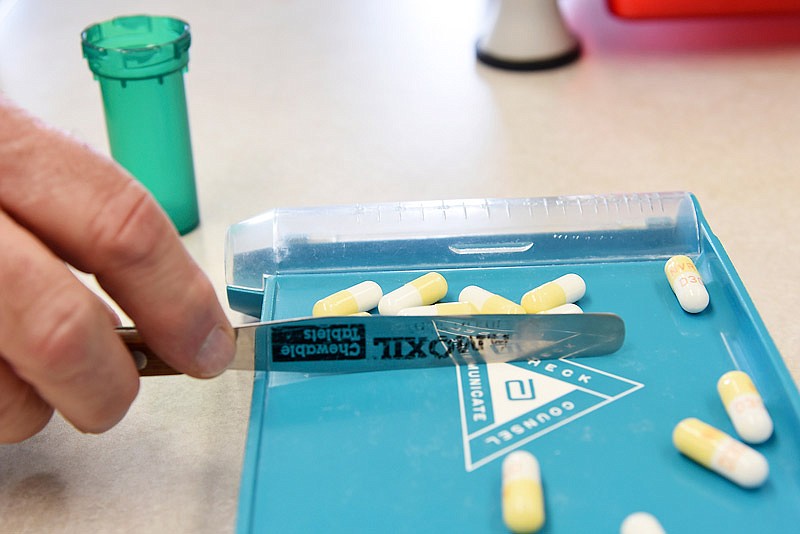Despite the Missouri Legislature's failed attempt to implement a statewide prescription drug-monitoring program (PDMP), 28 counties and cities have stepped up to take charge of opioid abuse in their communities.
A PDMP serves as a way to help health care professionals identify drug-seeking behaviors in patients, who may be addicted to opioids or selling them illegally. The system would allow them to see a patient's prescription history, enabling doctors to flag potential opioid abusers.
Legislation surrounding PDMP has circulated the Legislature for five years now, leaving Missouri as the only state without one.
State Rep. Holly Rehder, R-Sikeston, and state Sen. Rob Schatz, R-Sullivan, said they will continue to make PDMP a priority next session.
"If we can't get a statewide program accomplished, I am committed to work to get this implemented outside of the Legislature," Rehder said.
Counties across the state were in support of the statewide legislation, but the Legislature's track record for failed PDMP attempts has led to St. Louis County implementing a program on its own, allowing 28 other counties - including Cole - to subscribe to it.
"I am disappointed the PDMP was not passed on a state level. However, I am relieved a bill that would have weakened our current PDMP didn't pass," said Kristi Campbell, director at the Cole County Health Department.
Campbell said the version considered toward the end of the session set time limits on the data, which could have been detrimental to the strength of the program.
There was support from both sides of the aisle for the legislation, but state Sen. Rob Schaaf's, R-St. Joseph, concerns about protecting patients' privacy and security became the center of legislative rivalry.
During the session's early stages, Schaaf filed a bill that would enhance the PDMP's level of security by limiting the amount of information accessible to physicians who subscribed to the program. Despite compromises, his bill never made it out of the House.
Throughout the session, Rehder and Schatz fought to get Missouri on board with the other 49 states, which they say serve as models for a statewide PDMP.
House Bill 90 and Senate Bill 314 outlined how a statewide system would grant access to health care professionals, including pharmacists and dentists, who prescribe narcotics.
The final version of the bill, Rehder said, set a two-year rolling purge of the data and a mandate clause for physicians, granted citizen firearm protections, and prohibited patients' information from being used as evidence in an investigation.
The program is applicable to narcotics listed as Schedule II-IV - which includes controlled substances such as oxycodone, percocet and fentanyl - all known to have high potential for abuse.
During committee hearings, Rehder said she has seen drug abuse from both sides, growing up in a family with a history of drug addiction while helping her own daughter combat opioid abuse for 13 years. Her daughter became addicted after being prescribed Lorcet, a form of hydrocodone.
"When a physician can look at their patient's narcotic history, they can make the best call for the patient, and that's what we really want," Rehder said. "Yes, we want to be able to catch the doctor shoppers so that we don't have a plethora of pills out on the street. But more importantly, though, we want the physician to be able to say we have a problem here and start looking at other paths."
By closing day of the legislative session, local representatives knew there was a slim chance of it passing this year.
U.S. Rep. Claire McCaskill called for Gov. Eric Greitens to call a special session of the Missouri Legislature to resurrect the PDMP bill. Instead, Greitens called a special session to begin Monday only on the topic of the steel mill bill that could create hundreds of jobs in southeast Missouri.
The Missouri State Medical Association, which initially favored the PDMP bill, became its opponent due to the physician utilization mandate.
"We currently believe in the stronger patient-friendly county programs," said Ken Jackson, MSMA director of legislative affairs. "We weren't willing to compromise the county programs with a watered-down statewide PDMP just for the sake of saying we finally passed a PDMP bill."
Jackson said MSMA's greatest concern was passing PDMP with less-stringent regulations that would wipe out these stronger county programs.
Counties that have implemented the program do not require a mandatory data purge, which is the version Jackson said is necessary in order for health care professionals to identify potential opioid abusers over time.
Daniel Kleinsorge, Schatz's chief of staff, said there is a chance the county programs may be challenged in court, and the court's decision will determine their next move.
"If the court upholds the counties' ability to implement PDMP programs, this will enhance what Sen. Schatz and Rep. Rehder have been working towards. Plus, this is the version everyone is in favor of," Kleinsorge said. "If they get knocked down, then we go back to the drawing board."

